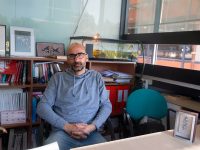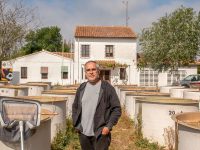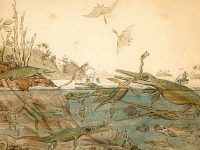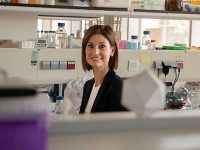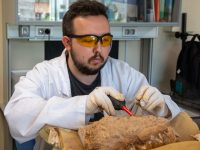Interview with Loeske Kruuk
«Climate change has effectively created a huge open-air experiment»
Professor of Biology at the University of Edinburgh
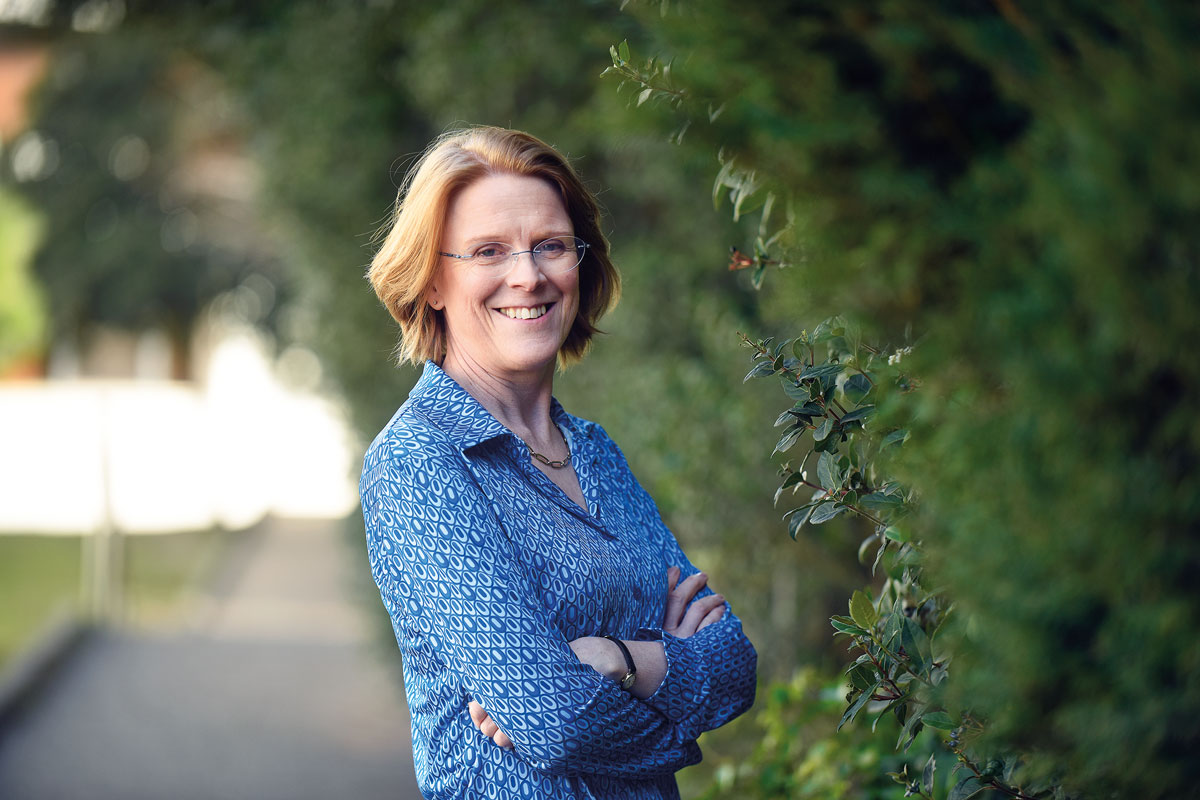
Every year, the Cavanilles Institute of Biodiversity and Evolutionary Biology hosts the Peregrí Casanova Memorial, a conference that celebrates the long evolutionary tradition of the University of Valencia by inviting world-class evolutionary biologists, leaders in their fields, to give a lecture on topics at the cutting-edge in ecology and evolution. This year we had the great privilege of hosting Dr. Loeske Kruuk, Professor of Biology at the University of Edinburgh and recently elected Fellow of the Royal Society. Dr. Kruuk’s work focuses on understanding the evolutionary and ecological processes of wild animal populations. Her studies have advanced the analysis of quantitative genetics in natural populations and its use to test the foundations of evolutionary theory. She has worked with diverse populations of wild animals, mainly mammals and birds, through long-term studies that combine the analysis of genetic and life history data of thousands of individuals across generations. Her research has demonstrated the existence of a great potential for evolutionary adaptation and responses to natural selection, particularly relevant in the current context of global change.
I understand that, as an undergraduate, you started studying maths. What made you veer into biology and why evolutionary biology?
Yes, my undergraduate degree was maths– which I loved as an academic exercise, and a maths degree is the most amazing mental training. I liked the pure, very abstract parts and the statistical parts, but I was not so good at the more applied, physics-like parts. I probably never really thought through how I might use maths later on, and it never really occurred to me (nor were we ever told as undergrads) that it would be useful in biological research. My father1 is a biologist, who worked on the behavioural ecology of carnivores. So I’d grown up learning a lot about natural history, being lucky enough to travel to some amazing places with him – and I guess appreciation of the natural world was always there as a foundation. But as a teenager I thought I’d be original and go in a different direction, hence the maths. After my undergraduate degree, my plan was to have a year out before starting a maths PhD. I went to Australia for that year out, worked in a statistical consultancy in Sydney for a while, and then travelled round some remote parts of Australia, including volunteering on conservation projects. The whole experience made me realise that a maths PhD was not what I wanted to do, and so I set about trying to reinvent myself as a biologist. This meant an MSc in Ecology, and then I was lucky enough to get a PhD place with Nick Barton, who was then at Edinburgh, for a population genetics project studying a Bombina (fire-bellied toad) hybrid zone. The PhD was a great mix of fieldwork in beautiful forests in Croatia, combined with some mathematical modelling and simulation studies. So I ended up coming back to biology after all – which I think my family all thought was quite funny. My natural history and field skills are very amateur compared to my dad’s (and I suspect he is a little bit dismayed at how much time biologists nowadays spend sitting in front of computer screens rather than in the field!). But it is completely lovely being able to talk to him about what I’m doing and show him my work. And maybe it is because of my maths background that I gravitated to evolutionary biology, which has this core structure of the theory of adaptation by natural selection.
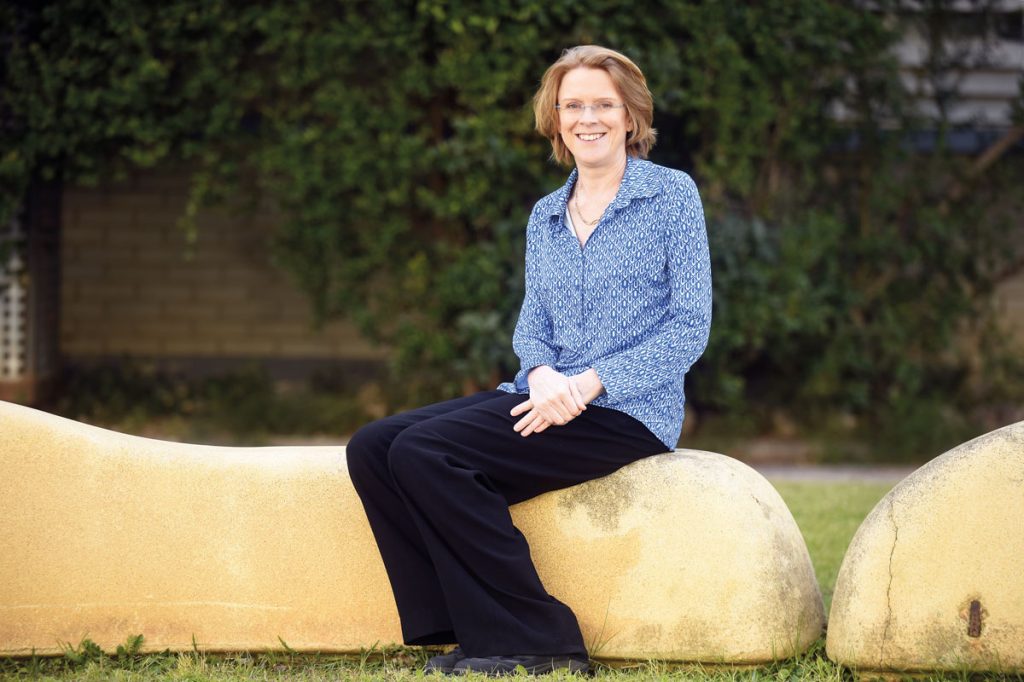
The professor considers that long-term studies are where some of the most fundamental and ancient theories of evolution can be put to the test. / Photo: Daniel Garcia-Sala
What other scientific influences have shaped your career?
All the way along, I think it was really important to me knowing of examples of female scientists in the past –for example, Mary Somerville, the 19th century mathematician after whom my undergraduate Oxford college was named. Thinking more specifically, I know this is very unoriginal, but Darwin is a towering figure, for building fundamental theoretical principles from observations of natural history. More directly, my career has been very much shaped by having worked with many excellent colleagues.
You have devoted most of your work to studying vertebrates in the wild, particularly to long-term studies of individuals and populations. Why?
I first got involved with long-term studies of individuals in my postdoc project on red deer on the Scottish island of Rum. The wealth of long-term detailed life-history data, on thousands of individuals across several decades, got me hooked on the scientific value of long-term, individual-based studies. Since then, I’ve worked on several others. And my family and I spent most of the last decade in Australia, and two of my main projects I worked on there were long-term studies of a co-operative breeder, the superb fairy-wren, and an eastern grey kangaroo study. With all these studies, what I love is the fact that you observe an individual’s life history, shaped by all the natural forces of environment and genetics, from birth, through any reproductive events, to death. So, whilst you obviously have very different species in very different environments, you can test some of the most fundamental, long-standing theory of evolution. This is especially the case where you have pedigree information, which is just so simple: three columns of information, for each individual, showing who its mother was and who its father was, and another column for when it was born too. You can do so much with that, combined with other trait measures: look at variation in fitness and hence natural selection, mating patterns, ageing, inheritance and genetic variance, temporal trends, maternal effects, inbreeding and inbreeding depression, ageing and senescence, and so much more. And combining this with records of environmental conditions, you can explore a range of questions about how both environment and genetics shape animals’ phenotypes and ultimately population dynamics.
Is it a bad time in science for this type of study?
I do not think it is a bad time for long-term studies – if anything the opposite! The main reason I say this is maybe a bit depressing, which is the need to understand the effects of anthropogenic environmental change on natural populations. It is particularly relevant for understanding effects of climate change, but there are other ways in which environments are being affected: habitat loss, disease, pollution. Long-term studies are one of the most valuable tools for investigating different causes of change, and identifying the mechanisms by which populations respond.
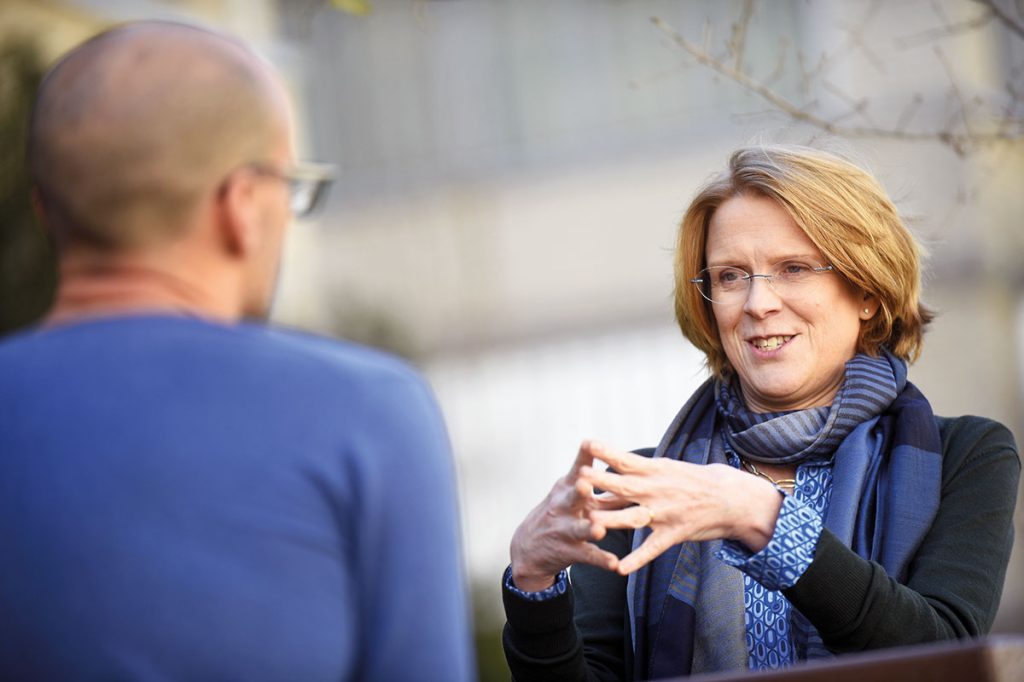
According to Kruuk, we «need to understand the effects of anthropogenic environmental change on natural populations». / Photo: Daniel Garcia-Sala
But do we have an adequate incentive system?
Long-term studies rely on continuity of research funding, and maintaining that through short-term (typically three year) grants is really tough, in what feels like an ever more competitive funding environment. With long-term studies you can get questions of «don’t we know everything about this species/population already?», and hence «why is there any need to fund further data-collection?». I think the argument is particularly short-sighted with regard to looking at ongoing effects of climate change, because environments change. Also, small changes in biological systems can led to large long-term effects, but we’ll only see that if we have long-term data. There is massive value in continuity, and the questions we can ask given new technology also change.
A classic conundrum in evolutionary biology is to disentangle what processes maintain genetic variability in wild populations. Can you briefly explain why this is a key question?
The core of evolutionary biology is understanding variation, at whatever level: within a genome, across a lifetime, between individuals in a population, between populations of different species, or ultimately between different species. And, critically, adaptive evolutionary responses to natural selection require genetic variance in fitness in a population. But if Darwinian selection is going to favour the best traits, or the most fit individuals, it should eliminate less fit allelic variants. That means that, all else being equal, there should not be any variation left at equilibrium, because less successful variants will have been weeded out. However, when we look in natural populations, we see abundant genetic variance. So, we are not at equilibrium, and there is obviously not a single «fittest» genotype, so there’s a huge question of what is maintaining genetic variation. Why? Obviously genetic mutation will be constantly adding variation, but that is unlikely to be sufficient to counter erosion by natural selection because beneficial mutations arise slowly. There are lots of interesting alternative explanations to explore here. Selection pressures may change with environmental conditions (both temporal or spatial), or genetic variation may be expressed differently in different environments, what we call plasticity. Or there may be different routes to the same end-point, involving trade-offs between, say, longevity vs annual fecundity.
What have we learnt on this issue from long-term studies in vertebrates?
A key recent finding is that, in many populations, there is abundant heritable genetic variance underlying an individual’s lifetime reproductive success, or fitness. From fundamental evolutionary theory, this indicates ongoing adaptation, such that natural selection is generating an increase in average fitness from one generation to the next. Surprisingly, mostly this does not translate in populations growing, which implies a deterioration of environmental conditions at the same time, which is something I am very interested in. Without evolutionary adaptation, population dynamics may have been very different, and many would have probably gone extinct quickly. Similarly, evolutionary theory poses that when you have strong selection on a trait that is variable, and this variation is heritable (i.e., partly determined by genes), the trait should evolve quickly. Yet, a lot of work from long-term studies has shown evidence of strong natural selection and heritability for a range of different traits but haven’t generally predicted the evolution of these traits well. This may be because the environment has changed too, again highlighting the need to understand underlying ecological conditions.

Kruuk emphasises that pressure and stress seem to be «taking a larger toll on people’s ability to lead balanced lives». / Photo: Daniel Garcia-Sala
What about maternal effects, that is, when the behaviour, physiology or morphology of the mother affects the phenotype of its offspring due to effects during gestation or parental care?
Maternal effects are a really interesting aspect of life history evolution and behavioural ecology. You are starting with just thinking about the basic premise of how one individual affect another, but also considering what selective pressures shape maternal effects, what is optimal for the mother versus for her offspring, and how much maternal effects themselves are genetically versus environmentally determined. From a genetic point of view, maternal effects were traditionally often characterised as being environmental «noise» that needed to be corrected for to avoid over-estimating the importance of genetic effects (in generating similarity between siblings). But there is increasing realisation that maternal effects can have a substantial genetic component themselves, and these can covary with the direct effects of an individual’s genes on its own phenotype. For example, in our red deer study population, variation in a calf’s weight at birth is more determined by maternal genetic effects (i.e., maternal genotype) than by the calf’s own genotype. There are also interesting philosophical questions concerning maternal effects when thinking about an individual’s fitness, its contribution to future generations. This all just raises questions of «whose fitness is it?». Maternal effects are an interesting special case of indirect genetic effects, where we’re just thinking about how genes in one individual affect the phenotypes and ultimately fitness of others.
From early on, you have devoted considerable efforts to try and understand how populations respond to climate change, and this seems to be an increasing focus of your research. Why is this important? What have we learnt?
Current climate change has effectively created a huge open-air experiment of shifting environmental conditions. Whilst it is fascinating to see what happens, it is also alarming. There is a lot of evidence about advancing phenology (the timing of biological events, such as when to start reproducing) in recent decades across multiple different populations of animals and plants, but we need to understand the actual mechanisms driving that. With our red deer study, our detailed individual-level analyses have shown that those advances result from both phenotypic plasticity – or change within individuals – in response to warming temperatures, and also from genetic evolutionary change in line with natural selection favouring earlier breeding. There are other examples from long-term studies of how climate can affect population dynamics via individual life histories: for example, with the superb fairy-wrens in Australia, we found that warming temperatures had unexpected adverse effects. Here, adult birds were more likely to die in the winter following hot summers, presumably because of some physiological costs. In another project I was involved with, we analysed life history data from multiple European bird populations, and showed that warming temperatures only explain on average half the trends over time, and there must be other processes involved too. So that was a useful illustration that we should not just think about the effects of warming when considering change. I guess the main point is that, overall, the changing climate is one of the key reasons that it is important to study wild populations in natural environments, experiencing realistic ecological conditions.
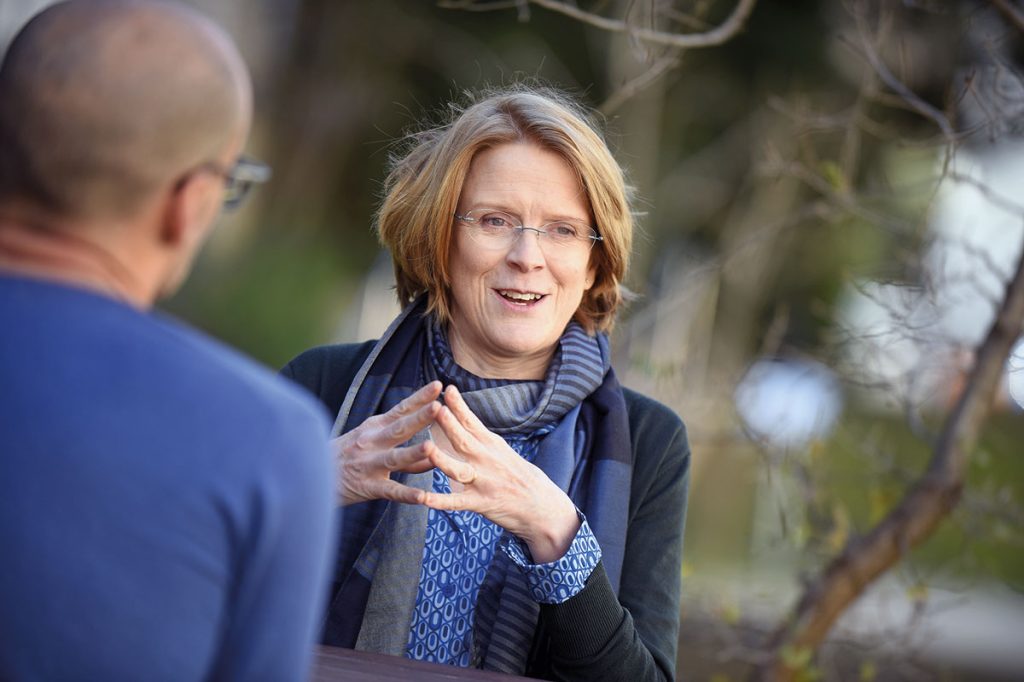
Loeske Kruuk asks, «if we know an individual’s whole genome, how well can we predict individual traits and life histories, and from that, how well can we predict the dynamics of whole populations?» / Photo: Daniel Garcia-Sala
What are some of the outstanding current challenges in evolutionary biology?
There are so many current challenges, and important questions still to be asked. Thinking more broadly, some of the most exciting developments on the horizon are going to result from access to ever higher-resolution genetic information: if we know an individual’s whole genome, how well can we predict individual traits and life histories, and from that, how well can we predict the dynamics of whole populations? But there are also really interesting new expansions possible at different scales, for example into the causes and consequences of variation in individual microbiomes, or looking at social interactions and networks between individuals.
If you could go back in time, what advice would you give yourself at the beginning of your PhD or more generally during your early career?
That is a difficult question! Being totally honest, I think I have had imposter syndrome the whole way along, of worrying at every stage that it is a mistake that I have got this far. I cannot pretend I have found a solution for that. This is especially so when it comes to public speaking, which still terrifies me. But it probably would not have been helpful to my younger self, to know that I would still dislike public speaking thirty years after starting my PhD! But here is another key point that I once read: choose colleagues who are both good at what they do, and are nice people to work with. Science is a very social exercise, and so much progress, and your enjoyment of it, depends on team dynamics. Work with people you like. The other really important aspect of working with people is kindness and manners: they are so under-appreciated but so essential. This is the sort of thing I say to my kids, but so often I feel many grown-ups need reminding of it too! And, the most important bit of advice I try and give to early career researchers now: your personal life and happiness is much more important than work. Look after those, take proper breaks, do not always prioritise work over the rest of your life. Productivity does not necessarily increase with working more and more hours, so a healthy work/life balance is really important.
What has your experience been of maintaining an academic career with having a family, and how have these issues changed?
Attitudes towards women in science in general have certainly changed over my career. There is undoubtedly still a long way to go, but it is better than it was. Most importantly, I think there has been large change in acceptance of women combining family with a scientific career. I had two extended periods of maternity leave when my kids (a daughter and twin sons) were born, and then worked part-time for fourteen years. I was only able to do this because of the flexibility of research fellowships, without which, being honest, I might have given up academia. I repeatedly got the impression that people thought that being part-time meant I was not serious about my scientific career. I hope that has changed, or is changing. Also, it is nice to see formal acceptance of childcare being taken on by fathers as well as mothers. Back when our twins were born, we asked if we could split parental leave between my husband and me, but were told we could not do that because it would «set a precedent»… It is obviously hard work for anyone juggling family and a demanding (if very rewarding) job, and the only way I managed it was having really clear boundaries between work and life.
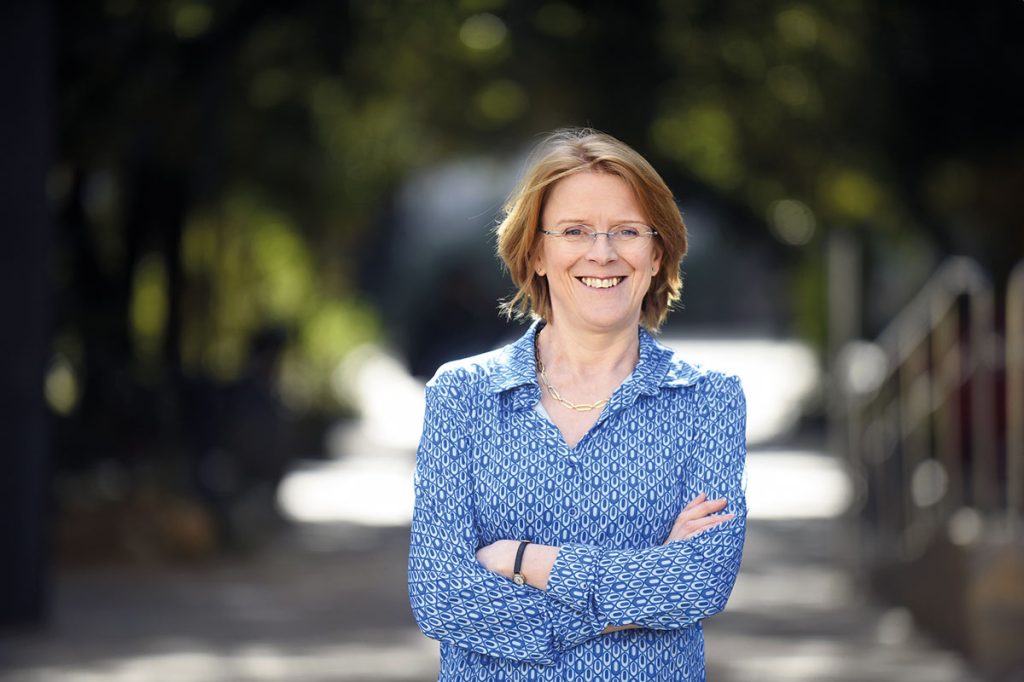
«It feels like a huge privilege to be able to think about really powerful ideas, test them in natural systems, and work with interesting people from all across the world.» / Photo: Daniel Garcia-Sala
What are other key changes you have noticed in academia?
The changing attitudes to women and parenting that I mentioned are definitely positive changes. But in terms of other changes, it is worrying how the pressure and stress seems to be more now than previously, and seems to be taking a larger toll on people’s ability to lead balanced lives. Obviously, the chaos of the pandemic has added to all that stress, and we have not recovered from that. I realise social media is really valuable in many ways, but I am not sure it has helped with fostering a supportive environment, especially with regard to people being kind and polite to each other. On the one hand, we are all much more aware of the issues, but on the other hand, the pressures seem have got worse, not better, and natural courtesy to have declined. I think it is also really tough how late in their careers people have to wait for job security. For early career researchers, one thing that has always bugged me is this insistence on moving institutions or even countries. Yes, it is very valuable and rewarding to experience different research environments. But your personal life is so much more important, and if someone cannot – or does not want to – move for personal or family reasons, that should never be held against them. All the big moves I have made in my life were for personal or family reasons, though I know I was very lucky to be able to do this.
Last question, we need to incentivise scientific careers! What is the best part of being a scientist?
I feel incredibly lucky to do this job: it feels like a huge privilege to be able to think about really powerful ideas, test them in natural systems, and work with interesting people from all across the world. There may be some aspects that are tough or tedious, but never the actual science, and I realise I am so lucky being able to say that of a job.
Notes
1. Famous Dutch ethologist Hans Kruuk. Go back.

